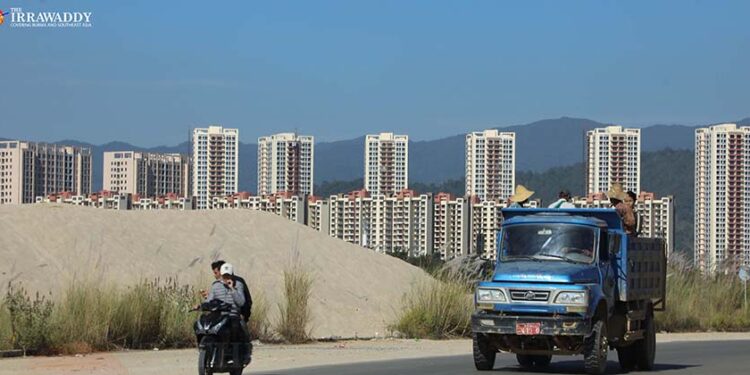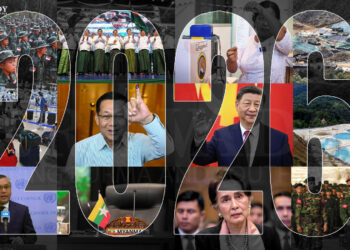YANGON—With China’s ambitious backbone infrastructure projects set to get off the ground this year in Myanmar, mostly in the ethnic states, environmentalists and local observers warn that the National League for Democracy-led (NLD) government will face severe public resistance if it keeps failing to address a lack of transparency surrounding the projects, and to engage with local communities.
The environmentalists and local observers said locals’ objections to the projects will be one of the biggest challenges faced by the NLD government in its upcoming term. The China-backed projects are hugely unpopular across the country, especially in the ethnic states, due to the long, troubled legacy of the former military junta’s extraction of natural resources without public engagement or consultation.
U Win Myo Thu, the chairperson of the Green Motherland Development Association and director of EcoDev Myanmar, one of the country’s leading environmental organizations, told The Irrawaddy that lack of transparency and failure to engage with locals were the biggest weaknesses shown by the NLD government when handling China-Myanmar Economic Corridor (CMEC) projects during its first term.
The CMEC is a part of Chinese President Xi Jinping’s ambitious grand infrastructure plan for the region, the Belt and Road Initiative (BRI). China has proposed nearly three dozen projects including strategic infrastructure projects such as the Kyaukphyu Special Economic Zone (SEZ) in Rakhine, which will give China access to the Indian Ocean, a New City project in Myanmar’s commercial capital, and the Muse-Mandalay railway project connecting two economic centers in Myanmar with Kunming, the capital of Yunnan province in southwestern China.
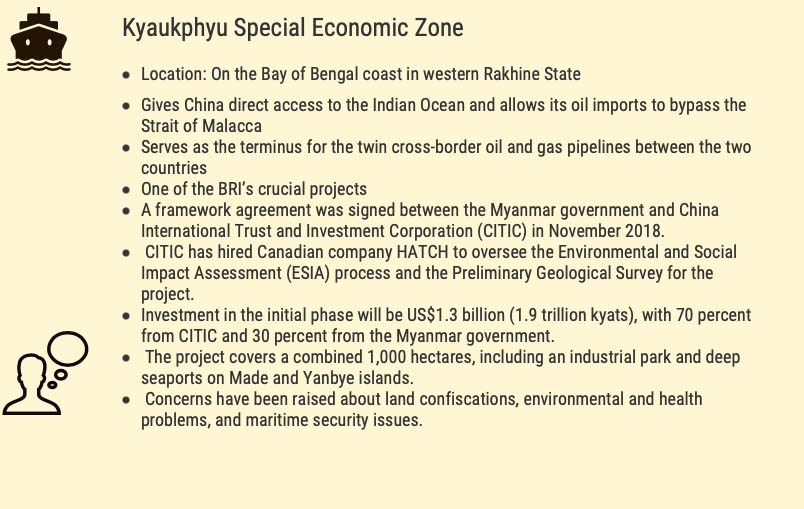
Though the government in Naypyitaw has signed agreements to implement China-backed projects, local residents have received little information about them, fueling growing concern among the public during the past few years, especially regarding the social and environmental effects of the projects, U Win Myo Thu said.
Myanmar joined the BRI in 2018, agreeing with China to establish the estimated 1,700-km-long CMEC, which will connect Kunming with Mandalay in central Myanmar, and then branch east to Yangon and west to the Kyaukphyu SEZ. Since then, however, the government has not officially disclosed details of its agreement with China, particularly Myanmar’s commitments, and how the CMEC would be implemented in the country.
Last year, during Chinese President Xi Jinping’s trip to Myanmar, the government showed its willingness to move Beijing’s ambitious plan forward by signing agreements on the backbone projects of the CMEC.
Northern Shan State will be home to some of the major CMEC projects, including mega infrastructure projects such as the Muse-Ruili cross-border economic cooperation zone and the Muse-Mandalay railway, which is to be the initial stage of a larger China-Myanmar railway project which will connect with the Chinese rail network at the border town of Ruili in Yunnan province and is expected to be a key part of the economic corridor.
U Aung Myo Htun, project officer at the Heartland Foundation, an environmental watchdog team monitoring CMEC projects based in Lashio, northern Shan State, said that although a feasibility study and Environmental Impact Assessment (EIA) for the Muse-Mandalay railway project were completed in 2019, local people still have no idea about what the project will entail.
He said the EIA’s public consultations were done with a group of people who do not widely represent the affected local communities.
The Heartland Foundation has held several public awareness meetings in locations in northern Shan State through which the Muse-Mandalay project will pass. U Aung Myo Htun stressed that land grabbing is the biggest concern among locals when it comes to the railway project.
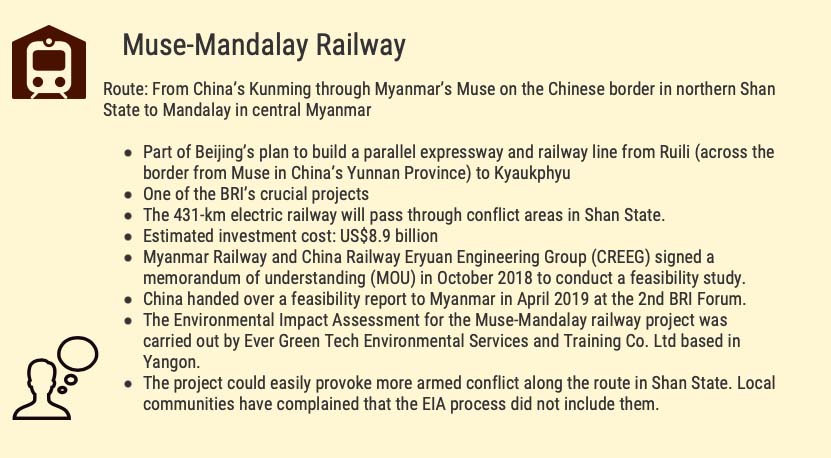
In ethnic areas of Myanmar, people customarily use a shared land ownership system that includes freehold land, community forest reserves and customary tenure for rotational farming practices. Amended in 2018, the Vacant, Fallow and Virgin (VFV) Lands Management Law has been criticized by ethnic people for failing to recognize ethnic customary tenure.
U Aung Myo Htun said the majority of affected villagers along the railway route do not have ownership certificates to prove their rights to their land, adding that, “If people lose their farmland, they will lose their livelihoods. The government needs to make clear what kind of guarantees it will make [to prevent] such losses.”
He added that public objections could lead to project delays if the government doesn’t take the views of local people into consideration.
“Locals are already suffering so much due to Chinese projects [in northern Shan State]. The negative sentiment is everywhere here and if it explodes, it will create a crisis for the government,” he stressed.
Myanmar and China have held several meetings on construction of the cross-border economic cooperation zones (CBEZs) in Shan and Kachin states. Last month, the two sides finalized the location and size of the Muse-Ruili CBEZ in northern Shan State.
While discussions on the CMEC projects have progressed—some are almost ready for implementation—the Shan State parliament has yet to discuss the projects. Moreover, in July, Lower House lawmaker U Sai Tun Aye from Monghsu in northern Shan State submitted questions on the projects to related government ministries. He sought details of the projects and the government’s plan to address land confiscations in the project areas, and called for transparency relating to BRI proposals.
However, no representatives of the ministries concerned attended Parliament, according to U Sai Tun Aye, who was told that his questions were too broad.
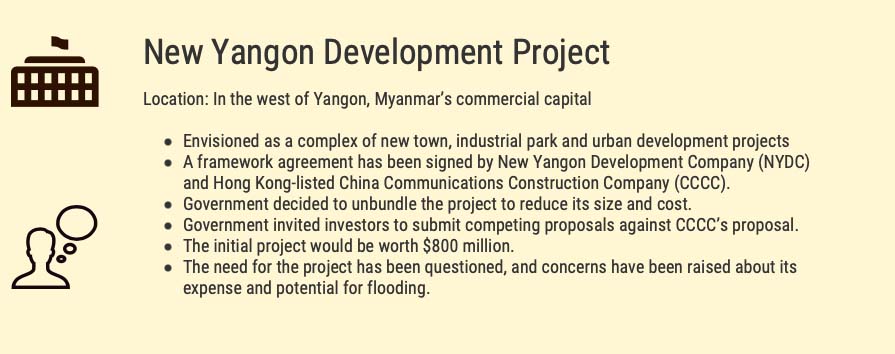
U Soe Nyunt Lwin, the Shan State minister for planning and finance, told The Irrawaddy that CMEC projects are handled directly at the Union level, adding that the state government has no authority to make decisions relating to the projects.
“If the Union government asked them about [public engagement], we will work on it. So far, there is no plan to explain the projects to locals,” U Soe Nyunt Lwin said.
In Kachin, two major projects are planned under the CMEC agreements. The US$400-million (527.29-billion-kyat) Myitkyina Economic Zone is to be developed on 4,700 acres (1,900 hectares) of land along the historic Ledo Road in Myitkyina, the capital of Kachin. Moreover, the government has signed an agreement with a China-backed company to develop a business park at an estimated cost of $22.4 million on nearly 70 acres in Kanpiketi, a border town in northern Kachin State’s Special Region 1. The area is controlled by the New Democratic Army-Kachin (NDAK) militia, which is allied with the Myanmar military.
Local observer and lawyer U Gannes Basnez, who works with local residents on land issues, told The Irrawaddy that the public in Kachin has a negative attitude toward Chinese projects due to their past experiences.
In Kachin, the controversial, suspended $3.6-billion Myitsone hydropower dam has faced serious objections not only from Kachin people but also across the country. In the latest example of Chinese investment arousing negative public sentiment, China-backed banana plantations are facing local objections due to fears of environmental damage and land loss.
U Gannes Basnez said that “Due to the past experiences they have suffered, people have no trust when it comes to Chinese investment.”
“They have no expectations of job opportunities, technical transfers or other benefits. The only things they expect from the projects are [negative] social and environmental impacts,” he said.
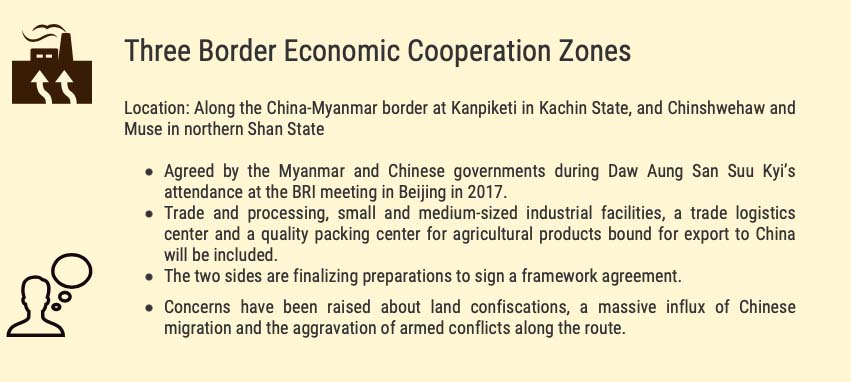
So far, the Kachin government has not held any public consultations or awareness meetings on either the business park or the Myitkyina Economic Zone, despite having signed agreements with China-backed companies.
The Kachin government has ignored locals’ complaints over the banana plantations, U Gannes Basnez said, especially about the influx of Chinese migrants, loss of farmland and frequent incidents involving trucks used to transport the bananas. They have serious doubts as to whether the state government has the capacity to handle the large projects under the CMCE, he said.
“If they do not pay attention to locals, the resistance will be even more intense than it has been in the past few years, especially in ethnic areas,” U Gannes Basnez stressed.
Kachin State Chief Minister Dr. Hkyet Aung told The Irrawaddy that both projects are awaiting final approval from the Union level. However, he admitted that the Kachin government had not held any public awareness or consultation meetings relating to CMEC projects during the past five years.
“I think that local people should not oppose the projects because they will benefit them,” Dr. Hkyet Aung said.
Though the state government has not held public consultations, he said that “I believe… they have come to realize that the projects will benefit them.”
He was not able to answer The Irrawaddy’s question on why the Kachin government had failed to elicit the public’s views, despite the ongoing efforts to implement the projects by the state government.
U Win Myo Thu, the environmentalist, suggested the NLD government carefully observe the ground conditions and gauge the public sentiment and views on the projects.
“The government needs to amend all the laws relating to mega infrastructure projects, including environmental governance. And they need to form a third-party mechanism to handle public complaints,” he said.
He suggested the government draw up a safety framework for Chinese projects that assesses the risks posed by projects, in particular taking into account public sentiment and the social, environmental and political risks.
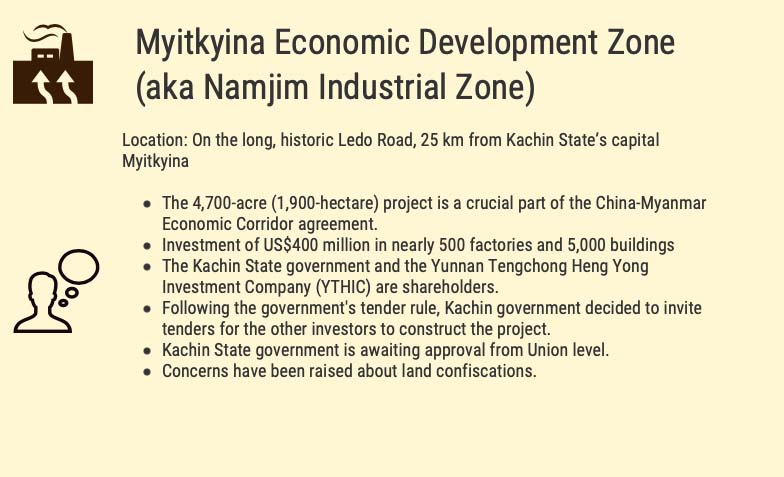
The environmentalist added that the government must amend the land law, which fails to recognize ethnic customary tenure.
“Since the government took office, they have not built good relations with civil society organizations [CSOs]. If they want more engagement with locals, they must build a good relationship with CSOs. Because CSOs already have close relations with locals, especially in ethnic states,” U Win Myo Thu said.
U Aung Myo Htun agreed with U Win Myo Thu, saying the NLD’s failure to engage with locals and CSOs has created an understanding gap regarding the government’s actual intentions when it comes to implementing the projects.
He said the government should try to improve checks and balances at the regional and state level to handle public complaints about projects, adding that accountability is the key to gaining the public’s trust.
The government needs to consider the environmental impact the projects will have, he added.
The World Wildlife Fund (WWF) listed Myanmar as being “highly impacted” in terms of the BRI’s overall environmental impact, and said the country’s threatened species were “critically endangered” due to the environmental impacts of the BRI.
U Gannes Basnez said the NLD should enhance the role of lawmakers in engaging with locals, adding that the party should urge lawmakers to increase their knowledge of the projects.
“MPs need to be able to explain to people on the ground about government projects. If the government is planning projects for the benefit of the people, it needs to go public and they should explain these projects in a transparent manner,” he stressed.
You may also like these stories:
Kirin to Continue Profit Denial to Myanmar Military Conglomerate
Myanmar Villagers Flee Warring Ethnic Armies in Northern Shan State


